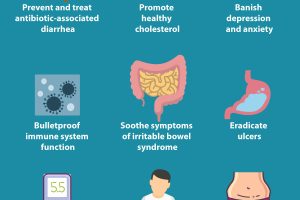The Key to a Healthy Gut: Probiotics Explained

Understanding the Gut Microbiome
The gut microbiome is a bustling community of trillions of microorganisms that reside in our digestive tract. Think of it as an entire ecosystem, complete with diverse species of bacteria, viruses, fungi, and other microbes. Each of these tiny players plays a unique role in maintaining our overall health, influencing everything from digestion to immune function. For instance, when I started paying attention to my gut health, I discovered just how much it impacted my energy levels and mood. It became clear that supporting this delicate balance was essential not just for feeling good on the surface, but for underlying health as well.
- The Key to a Healthy Gut: Probiotics Explained
- Understanding the Gut Microbiome
- Importance of Gut Health
- What are Probiotics?
- Definition and Types
- How Probiotics Work
- Health Benefits of Probiotics
- Digestive Health
- Immune System Support
- Sources of Probiotics
- Fermented Foods
- Probiotic Supplements
- How to Choose the Right Probiotic
- Strain Specificity
- CFU Count and Packaging
- Probiotics and Specific Health Conditions
- Irritable Bowel Syndrome (IBS)
- Inflammatory Bowel Disease (IBD)
- Probiotics for Overall Well-being
- Mental Health Benefits
- Skin Health Improvement
- Incorporating Probiotics into Your Diet
- Probiotic-Rich Recipes
- Tips for Maintaining Gut Health
- Potential Side Effects and Considerations
- Precautions for Certain Populations
- Interaction with Medications
- The Future of Probiotic Research
- Emerging Trends
- Exciting Developments
Importance of Gut Health
Maintaining a healthy gut microbiome is critical for various health reasons:
- Digestive Wellness: A balanced microbiome helps in effectively breaking down food and absorbing nutrients.
- Immune Function: A significant portion of our immune system is housed in the gut, making its health crucial for defending against pathogens.
- Mental Health: Emerging research shows a strong connection between gut health and mental well-being, often referred to as the gut-brain axis.
Prioritizing gut health offers a holistic approach to well-being that can lead to a happier, healthier life.
What are Probiotics?
Definition and Types
Probiotics are live microorganisms that provide health benefits when consumed in adequate amounts. Often dubbed “good” bacteria, they help maintain a balanced microbiome, which, as we discussed earlier, is vital for gut health. There are several types of probiotics, primarily categorized into two main groups:
- Lactobacillus: Commonly found in fermented foods like yogurt, this strain is known for aiding digestion and alleviating symptoms of lactose intolerance.
- Bifidobacterium: Often present in dairy products, it helps enhance immune function and reduce gastrointestinal disorders.
When I first tried incorporating yogurt into my daily diet, I was amazed at how much better my digestion felt, showcasing the real impact of these little helpers.
How Probiotics Work
Probiotics work by rebalancing the gut microbiome, doing things like:
- Inhibiting harmful bacteria: They compete for resources, making it harder for bad bacteria to thrive.
- Producing beneficial substances: Probiotics produce substances like short-chain fatty acids that support gut barrier function and reduce inflammation.
- Modulating immune responses: They can enhance immune function, providing a protective effect against infections.
By supporting our gut’s ecosystem, probiotics play an integral role in promoting overall health.
Health Benefits of Probiotics
Digestive Health
When it comes to digestive health, probiotics truly shine. They assist in breaking down food, absorbing nutrients, and maintaining a balanced gut flora. Here’s how they contribute:
- Relief from Bloating and Gas: Probiotics help balance the bacteria in your gut, reducing discomfort and gas after meals.
- Prevention of Diarrhea: Many studies have shown that probiotics can be effective in preventing and treating diarrhea, particularly antibiotic-associated diarrhea.
I can personally attest to the difference a good probiotic can make; after suffering from occasional bloating for years, I found relief by simply adding a daily probiotic supplement to my routine.
Immune System Support
In addition to promoting digestive health, probiotics play a crucial role in supporting the immune system. A significant portion of the immune system resides in the gut, and probiotics help it function optimally by:
- Enhancing Immune Response: Probiotics stimulate the production of antibodies and activate immune cells to fend off infections.
- Reducing Inflammation: They help regulate the gut’s inflammatory response, which can contribute to a healthier immune system overall.
With a stronger immune system, not only do you feel better but you also experience fewer sick days, making probiotics a valuable ally in maintaining health.
Sources of Probiotics
Fermented Foods
One of the most delicious ways to incorporate probiotics into your diet is by consuming fermented foods. These rich sources not only provide beneficial bacteria but also add vibrant flavors to your meals. Some popular fermented foods include:
- Yogurt: Often the first choice for many, yogurt contains live cultures that are great for digestive health.
- Kefir: This tangy drink is a fermented milk product packed with probiotics and is a great alternative for those who may be lactose intolerant.
- Sauerkraut: Fermented cabbage not only offers flavor but is also high in healthy bacteria and vitamins.
- Kimchi: A spicy Korean dish made from fermented vegetables, kimchi adds a unique kick along with probiotic benefits.
When I first tried making homemade sauerkraut, I was amazed at how simple it was and how much flavor it added to my meals!
Probiotic Supplements
For those who may find it challenging to get enough probiotics through food alone, probiotic supplements provide a convenient option. These come in various forms—capsules, tablets, powders, and even gummies—making it easy to find one that fits your lifestyle. When choosing probiotic supplements, keep these tips in mind:
- Check the CFU Count: Look for supplements with at least 1 billion CFUs (colony-forming units) for effective benefits.
- Examine Strains: Select products that contain multiple strains to target various health benefits.
I started using probiotics in capsule form during a busy season, and it was a game-changer for maintaining my gut health while on-the-go. With both food and supplements at your disposal, there are plenty of ways to support your gut health effectively!
How to Choose the Right Probiotic
Strain Specificity
Choosing the right probiotic is crucial to ensure you get the desired health benefits. One of the first things to consider is strain specificity. Different probiotic strains have unique benefits and can target various health concerns. For example:
- Lactobacillus rhamnosus: Known for supporting gut health and reducing diarrhea.
- Bifidobacterium longum: Effective in easing symptoms of IBS and enhancing immune function.
When I was looking for a probiotic to address my digestive issues, I discovered the importance of researching specific strains. This helped me select a product tailored to my needs, making a noticeable difference.
CFU Count and Packaging
Another key factor in selecting a probiotic is the CFU (colony-forming unit) count. This number indicates the potency of the probiotic. Aim for:
- At least 1 billion CFUs: This is often considered the minimum effective dose.
- Proper packaging: Probiotics are sensitive to heat, moisture, and light, so look for products in dark, airtight containers to preserve their efficacy.
Many brands have clear labeling, allowing consumers to make informed choices. By prioritizing strain specificity and CFU count, you can find the perfect probiotic to boost your health journey!
Probiotics and Specific Health Conditions
Irritable Bowel Syndrome (IBS)
Irritable Bowel Syndrome (IBS) is a common digestive disorder that can lead to symptoms like bloating, gas, cramps, and changes in bowel habits. Probiotics have shown promising results in alleviating these symptoms for many people. Research suggests that certain strains can help:
- Reduce bloating and discomfort: Probiotics like Lactobacillus plantarum may help relieve gas and bloating.
- Stabilize bowel movements: They can aid in regulating either diarrhea or constipation, which is often a struggle for those with IBS.
I remember speaking with a friend who managed her IBS symptoms significantly by incorporating a specific probiotic into her routine, allowing her to enjoy meals without the constant worry of discomfort.
Inflammatory Bowel Disease (IBD)
Inflammatory Bowel Disease, which includes conditions like Crohn’s disease and ulcerative colitis, involves chronic inflammation of the gastrointestinal tract. Although probiotics are not a cure, they can play a supportive role in managing symptoms and promoting gut health:
- Reduce inflammation: Some studies suggest that probiotics can help reduce inflammation markers in the gut.
- Support remission: Maintaining a balanced gut microbiome can be crucial for those in remission from IBD, helping prevent flare-ups.
Hearing accounts from individuals who experience fewer symptoms when regularly taking probiotics reinforces the idea that they can be a valuable tool for managing these challenging conditions.
Probiotics for Overall Well-being
Mental Health Benefits
Interestingly, the benefits of probiotics extend beyond gut health and digestion; they can also play a significant role in mental health. Research has found connections between gut health and mood, often referred to as the “gut-brain axis.” Here’s how probiotics may help:
- Reduction in Anxiety and Depression: Certain strains, like Lactobacillus helveticus, have been linked to lower levels of anxiety and depression symptoms.
- Enhanced Mood: By producing neurotransmitters like serotonin in the gut, probiotics can help elevate mood.
I’ve noticed that when I prioritize my gut health with probiotics, my overall mood feels more uplifted. It’s fascinating how interconnected our bodies truly are!
Skin Health Improvement
Probiotics may also benefit skin health, addressing issues like eczema, acne, and rosacea. Here’s how they can help:
- Reducing Inflammation: Probiotics can help manage skin inflammation, contributing to clearer skin.
- Balancing Skin Microbiome: Just like gut health, maintaining a healthy balance of bacteria on the skin can lead to improved skin conditions.
A close friend swears by her probiotic regimen, claiming that her skin has never looked better since she started focusing on her gut health. These multifaceted benefits showcase how probiotics can positively impact overall well-being, making them a worthy addition to many health routines!
Incorporating Probiotics into Your Diet
Probiotic-Rich Recipes
Incorporating probiotics into your diet can be both delicious and satisfying. Let’s explore some simple, probiotic-rich recipes that can seamlessly fit into your daily meals:
- Yogurt Parfait: Layer yogurt with fresh fruits, nuts, and a drizzle of honey for a balanced breakfast or snack.
- Kimchi Fried Rice: Stir-fry cooked rice with vegetables, and finish off with a generous helping of kimchi for a spicy twist.
- Kefir Smoothie: Blend kefir with your favorite fruits and a handful of greens for a refreshing and nutrient-packed drink.
When I first made kimchi fried rice, I was amazed at how easy it was and how much flavor it added to my dinner!
Tips for Maintaining Gut Health
Alongside diet, maintaining gut health requires daily habits. Here are some practical tips:
- Stay Hydrated: Drinking plenty of water supports digestion and helps probiotics thrive.
- Exercise Regularly: Physical activity promotes a diverse gut microbiome.
- Manage Stress: Practicing mindfulness or yoga can positively impact gut health by reducing stress levels.
By enjoying probiotic-rich meals and adopting these healthy habits, you can create a supportive environment for your gut health, reaping the numerous benefits that come with it!
Potential Side Effects and Considerations
Precautions for Certain Populations
While probiotics are generally safe for most people, there are specific populations that should approach them with caution. Individuals with compromised immune systems, such as those undergoing chemotherapy or with serious health conditions, could be at risk for infections from probiotics. It’s best to consult a healthcare professional before starting any probiotic regimen. Some other considerations include:
- Pregnant or breastfeeding women: Consult with a healthcare provider before use to ensure safety for both mother and child.
- Infants: Talk to a pediatrician before giving probiotics to babies, as their gut microbiomes are still developing.
I remember when a friend of mine, who was pregnant, was unsure about using probiotics. After consulting her doctor, she found a suitable option that supported her health during pregnancy.
Interaction with Medications
Probiotics can sometimes interact with certain medications, potentially affecting their effectiveness. Here are a few things to keep in mind:
- Antibiotics: While antibiotics kill harmful bacteria, they can also disrupt beneficial gut bacteria. Taking probiotics simultaneously may help restore balance, but timing is key—take them at least two hours apart.
- Immunosuppressants: If you’re on these medications, discuss using probiotics with your healthcare provider.
Navigating the world of probiotics and medications can be complex, but staying informed and consulting with professionals can lead to safe and effective use while reaping the benefits of these powerful microorganisms!
The Future of Probiotic Research
Emerging Trends
As science continues to explore the vast potential of probiotics, several emerging trends are shaping the future of research. One exciting area is the development of personalized probiotics tailored to individual microbiomes. This personalized approach may lead to more effective solutions for gut health and overall well-being. Here are a few additional trends to watch:
- Synbiotics: Combining probiotics with prebiotics to enhance the survival and efficacy of beneficial bacteria.
- Targeted Strains: Researchers are focusing on specific strains for targeted health benefits, such as mental health or metabolic disorders.
I recently participated in a webinar discussing these advancements and found it fascinating how individualized care is becoming a reality in healthcare.
Exciting Developments
Alongside emerging trends, there are many exciting developments on the horizon. Researchers are discovering new probiotic strains with potential benefits for various health conditions, including obesity and cardiovascular diseases. Additionally:
- Microbiome Transplants: Studies are exploring the use of fecal microbiota transplants to treat conditions like C. difficile infections and even conditions like autism.
- Gut-Brain Connection: Ongoing research is delving into how probiotics can impact mental health, potentially offering new avenues for treating anxiety and depression.
These advancements not only promise to expand our understanding of probiotics but also open doors to innovative treatments that could significantly enhance our quality of life in the future!




